Part 2 - Results
and table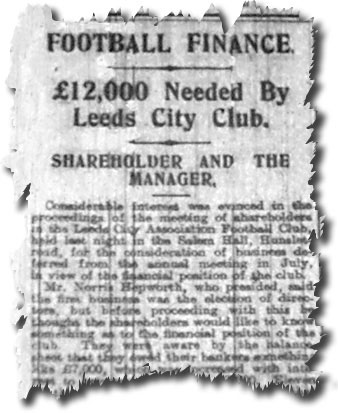
When a group of well-to-do West Yorkshire
businessmen formed Leeds City Association Football Club in August 1904,
hopes were high of a successful and prosperous future. After six grim
years, reality had set in; the team was customarily to be found in the
bottom half of the Second Division table, with a
17th place finish in 1910 representing a new low. It had taken a run
of six points out of the final eight to retrieve what has seemed a lost
cause as the team conceded 80 goals, the worst performance in the division.
Their onfield problems were eclipsed, though, by their business record.
After being floated in 1904 with an initial capital of £10,000 and enjoying
a profit of £122 during the debut League season, the club had consistently
returned losses. By November 1909 they were struggling under the yoke
of a £9,000 overdraft. The board struggled in vain to raise new funds
through a share issue and in the spring of 1910 shareholders pressed them
to report on the dire financial position.
After a summer of rumbling discontent, the club's annual general meeting
on 25 July gave the shareholders a long awaited opportunity to vent their
spleen.
Vice chairman Joseph Henry presided over affairs in the absence through
illness of chairman Norris Hepworth.
The Leeds Mercury: 'The chairman, in moving the adoption of the
report and balance sheet, said a loss of £1,904 took a lot of explaining
away, but he thought he could say with conviction that the reason why
the balance sheet was so bad was decreased income. The gate receipts were
down last year by £2,300 and the sale of tickets showed a decrease of
£269. But there would have been a very much worse balance sheet had there
not been a great reduction in expenses. What was the cause of these smaller
receipts? The shareholders might imagine that the shortcomings of the
directors were at the root of the trouble, but his opinion was this, that
the playing was so unsatisfactory that the public would not support the
team. (Hear, hear.)'
Henry went on to say that the board had introduced new measures to get
matters under control and that 'the directors had cut down expenses for
next season, and they intended to maintain that limit, whatever they might
suffer or whatever they might gain. The wage list would be cut down by
£1,000 (Hear, hear) and the directors would not keep on their books any
man who ought not to be there (Applause).' He hinted at a new scheme to
raise funds, but declined to elaborate while the chairman was away, promising
to reveal all in a special meeting.
Norris Hepworth duly arranged a second gathering, at Salem Hall at the
beginning of September; he revealed the true size of the club's problems,
reporting that they owed £7,000 to the bank, with interest increasing
the liability by £300. Eleven members of the board had agreed to guarantee
the debt, but the refusal of four directors to do likewise led to the
bank declining any further overdraft. Secretary-manager
Frank Scott-Walford was owed a further £3,500, incurred on operating
expenses, including £340 for players' wages over the summer.
Hepworth's sad conclusion was that the club needed to raise £12,000 to
clear the debts and provide sufficient working capital to cover day to
day operations. The directors had decided that the only option was to
raise the money by way of debenture loans; they had agreed to fund £8,000
themselves, the remaining £4,000 to be raised by shareholders and others.
Joseph Henry revealed that the problems originated from the time when
the club began redeveloping the Elland Road ground. The bank had been
reluctant to support the development and the club had been forced to switch
banks, with the directors guaranteeing an overdraft of £7,000. Losses
in 1909/10 had brought further pressure from the bankers.
The directors did not get an easy time of things at the meeting and both
Alf Masser and Harry Riley voiced doubts from the floor. They bemoaned
the lack of business acumen, claiming 'the directors had been failures
in regard to finance' and that 'it was useless to expect the club to lift
its head out of the hole into which it had got under the present board
of directors.' They demanded that the board be reduced to just 'five efficient
men'. The debenture scheme was adopted, with a rider from Joe Henry 'that
the scheme be referred to a committee consisting of the directors and
six shareholders chosen by the meeting with power to carry it into effect'.
Masser and Riley were put forward as shareholders' representatives along
with Messrs S Bodlander, W A Metcalfe, W Bromley and J Harrison.
Chairman Hepworth confirmed that all the directors were prepared to retire
except Mr Preston, with the object of the number being reduced, but it
was agreed that they should remain in office for the time being.
A further meeting was held on Saturday 17 September at the Grand Central
Hotel. Norris Hepworth confirmed that he would find £5,000 for the purchase
of the ground, the freehold of which he would hand over to the shareholders,
retaining a mortgage for the amount he paid for it. Alf Masser said that
if the club was to continue, the proposed arrangement was 'the best that
could be devised. If it was carried through, the shareholders would in
time see something for their money, while if the club was not continued
the shareholders would certainly lose everything'.
Masser also announced that 'the directors had agreed to pass a special
resolution at their next annual meeting reducing their number to five,
and of these five only one was to represent the gentlemen who were finding
the £8,000, while the other four were to be appointed by the shareholders,
thus giving the shareholders full control of the club. It was probable
that Mr Norris Hepworth would be the representative of those who were
finding the £8,000, and he was certain that Mr Hepworth was a gentleman
and a sportsman whom they did not want to lose. (Applause) With regard
to the other four they did not want to lose Mr Henry, but the shareholders
must be united in choosing their representatives, or some of the old directors
would be returned, and if they were the club would go back to a worse
position than it was in even now.'
There were some calls for the club to be wound up, allowing it to wipe
the slate clean and start afresh. There was a recognition, however, that
this would mean expulsion from the Football League and having to apply
for re-admission: 'That would be a tremendous disadvantage, and would
set the clock back not hours but days.'
The meeting was heated, but in the end the proposal was endorsed. Alf
Masser issued a public statement on behalf of the club, appealing for
contributions to the £4,000 required. Only time would tell whether there
would be sufficient support for the scheme to allow Leeds City to continue,
but for now at least they could totter on.
Against this backdrop of financial hardship, Frank Scott-Walford was
struggling to find a way to revive the club's playing fortunes. He was
accused during the shareholders' meetings of seeking players through the
Glasgow Labour Exchange, something he strenuously denied.
back to top
The summer brought the retirement of Jimmy Burnett and the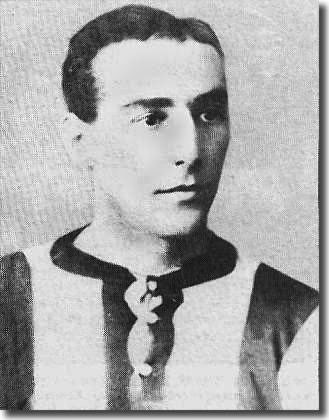 sale of Jimmy Gemmell (Sunderland), Tom Naisby (Luton) and Jock Watson
(Clyde). In October 1910, Jack White was also on his way, to Merthyr Tydfil.
Scott-Walford badly needed to rebuild his playing strength if City were
to compete effectively. The previous season had made that much clear.
sale of Jimmy Gemmell (Sunderland), Tom Naisby (Luton) and Jock Watson
(Clyde). In October 1910, Jack White was also on his way, to Merthyr Tydfil.
Scott-Walford badly needed to rebuild his playing strength if City were
to compete effectively. The previous season had made that much clear.
His initial strategy, when he arrived from Brighton in 1908, had been
to recruit players from the Sussex club, but the approach was unsuccessful;
Tom Morris was the only one of his imports who by now had an active role
in the team.
In 1909 Scott-Walford had signed two promising Irishman in Billy Halligan
and Tom Mulholland; a year later he returned to the Emerald Isle in search
of cheap recruits and brought in some youthful talent: Mick Foley, Joe
Enright and George Cunningham from Dublin Shelbourne, Billy Gillespie
from Derry Institute and full-back Alec Creighton from Belfast Distillery.
Gillespie, an Irish junior international centre-forward, was about to
sign for Linfield when Scott-Walford persuaded him to turn professional
and cross the Irish Channel. Cunningham and Enright had both represented
Ireland in games against the English and Scottish Leagues.
Other players signed were Scottish right-half John Harkins from Bathgate,
centre-half Chris Kelly from Denaby United and George Page, a forward
from Broxbourne.
Hugh Roberts' two brothers from Rhyl, Dick and Albert, also arrived at
Elland Road, moving in with their brother, who lived in a house in Beeston,
in the shadow of Elland Road.
In preparation for the new season, City held a pre-season trial, the
Reds against the Greens. For the Greens, Enright and Gillespie did well,
with the latter netting a hat trick, though Billy McLeod, for the Reds,
went one better, scoring four times as his side lost 6-5.
There was great excitement as City opened their campaign on 3 September
at home to Blackpool. Creighton was at right-back and Harkins left-half,
but the major changes were up front where Enright, Gillespie, Foley and
Cunningham were selected, with only Fred Croot of the old guard retaining
his position.
Completing the line up were 20-year-old keeper Tony Hogg, preferred to
the veteran Harry Bromage, George Affleck, Tom Morris and Stan Cubberley,
newly instated as club captain.
The crowd of 12,000 was the highest to watch City at Elland Road since
the visit of Bradford the previous November, and they were in high spirits.
The Leeds Mercury: 'Mr Scott-Walford evidently had an eye to making
his new men feel at home as well as to stage effect when he attired the
team in green jerseys and supplied green flags to mark the centre line,
and he apparently realised that the first match might go wrong when he
thus addressed them in his official programme: "Should your efforts
deserve success, and it is denied you, we shall extend our sympathy, when
you do badly we shall still think you have done your best."'
The game opened tamely, though City had some promising openings and Cunningham
went close with a fierce drive that passed narrowly over the top corner.
Blackpool were the better team in the first half, but it was City who
broke the deadlock four minutes after the break with a neatly created
goal. The Yorkshire Post: "Morris initiated the movement which led up
to it by passing to Gillespie in his own half, and the latter in turn
presently swung it out to Enright. He dribbled straight for goal, and
successfully recovered the ball after his progress had been impeded by
Gladwin, and shooting hard with his left foot sent the ball high into
the corner of the net - a success which occasioned a tremendous outburst
of enthusiasm."
The goal should have breathed confidence into Leeds, but their advantage
lasted only a few minutes as Blackpool equalised to quieten the crowd.
Hogg fluffed his clearance and the ball fell to centre-half Connor, who
fired home from long range.
The Seasiders dominated affairs from then on against a dispirited City
eleven, with only the debutants, Creighton and Enright, coming out of
the match with any great credit. Miller got an inevitable second for Blackpool
and the home side never looked like equalising, finishing in disarray.
Flaneur in the Leeds Mercury: 'The result was a bitter disappointment
to the City directors, to the manager, who has staked his reputation as
a judge of a footballer on these young Irishmen he has secured from the
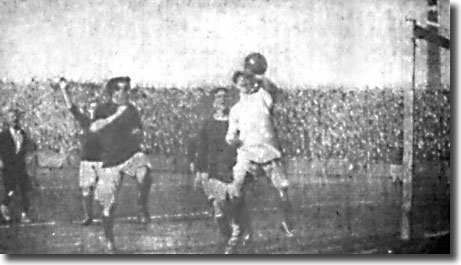 Dublin
Shelbourne, Belfast Distillery and Cliftonville clubs, and to the public,
who were present in very encouraging numbers indeed, and who tried their
utmost, by means of the new battle cry, 'Play up Ireland!' to stimulate
the young men on whom so much depends into putting forth their greatest
efforts.'
Dublin
Shelbourne, Belfast Distillery and Cliftonville clubs, and to the public,
who were present in very encouraging numbers indeed, and who tried their
utmost, by means of the new battle cry, 'Play up Ireland!' to stimulate
the young men on whom so much depends into putting forth their greatest
efforts.'
Jimmy Horsley and Billy McLeod were recalled in place of the injured
Cubberley and Gillespie for the following Saturday's visit to Glossop,
and again Joe Enright gave City a lead early in the second half. Again
the goal seemed strangely to destabilise Leeds and they spent the rest
of the game on the defensive.
Tom Morris was a rock in the rearguard and well supported by Creighton,
Affleck and Hogg, but could not keep the men from Derbyshire out for ever.
After being on almost constant attack, Glossop grabbed an equaliser and
ten minutes from time added a well deserved winner.
Two more single goal defeats followed, 1-0 at Elland Road against Lincoln
and 3-2 away to Huddersfield, to leave a dispirited City rooted to the
bottom of the Second Division table after four games, the only club in
either division in England without a point to their credit. It made for
dismal reading.
The team played with far more enterprise on October 1 at home to Birmingham
and led from a sixth minute goal by Gillespie. City seemed certain to
take the points, but conceded a penalty five minutes from time and had
to be content with a 1-1 draw.
The setback crushed the spirits and the Peacocks slumped back into their
shells a week later when facing West Bromwich Albion. Bowser gave the
Midlanders the lead after five minutes and Leeds never looked like getting
back on terms. Albion added a second in the thirtieth minute and assumed
complete command. Only a combination of a lack of composure on the part
of the West Bromwich forwards and a splendid performance in goal by the
reinstated Harry Bromage prevented a landslide.
Things looked bleak, but in midweek the West Riding Cup semi final at
home to Castleford Town brought a morale booster. Billy McLeod scored
five times as City ran out 8-2 winners. The task was rendered a formality
when an injury to goalkeeper Whelpion saw him leave the field.
The players displayed new spirit in their Elland Road derby on 22 October
against Hull City. The East Yorkshire team had the better of the first
quarter as the Peacocks started tentatively, despite having the wind at
their backs, but the home eleven ended the half on top with Fred Croot
threatening a breakthrough. The game seemed to be drifting towards a goalless
draw, but Leeds secured both points with a goal from Billy Gillespie ten
minutes from time. Hull defender McQuillan tried to head away but saw
his clearance fall to Hugh Roberts. The winger centred to Gillespie, who
dribbled past McQuillan and Nevison and hammered the ball past the advancing
keeper to settle matters.
Sportsman in the 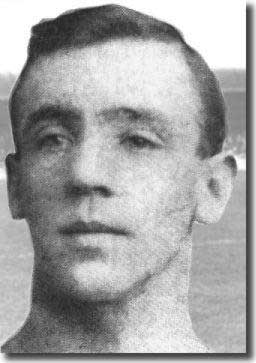 Leeds
Mercury: 'Leeds City … displayed better football than they had previously
done on their own ground this season, and well deserved their victory
by the only goal the game produced. True, 'one swallow does not make a
summer,' but, if only for a brief space, the darkness has been pierced,
and the club's supporters are thankful in that a little light has burst
through the surrounding gloom.
Leeds
Mercury: 'Leeds City … displayed better football than they had previously
done on their own ground this season, and well deserved their victory
by the only goal the game produced. True, 'one swallow does not make a
summer,' but, if only for a brief space, the darkness has been pierced,
and the club's supporters are thankful in that a little light has burst
through the surrounding gloom.
'Bromage gave a most capable exhibition in goal, and Creighton … was
much the better back, for Affleck miskicked repeatedly and often gave
cause for anxiety. Morris, though lacking in speed, and on occasion retaining
the ball too long, gave a useful display at centre-half; whilst Cubberley,
though beaten in more than one instance, did a few good things, and Harkins,
who is an advance on Kelly, was very serviceable. Of the forwards, the
outside men, Croot and Roberts, were the best. The former was particularly
prominent prior to the interval, with a number of good runs, whilst Roberts
was often to the fore afterwards. The failings of the inside men have
been alluded to, but nevertheless they accomplished some creditable work,
and Gillespie's goal compensated to a large extent for a number of missed
opportunities.'
back to top
The win was not enough to take City off the bottom of the table, but
the mood was lightened and the same team took the field at Fulham a week
later with high hopes. They gave a good display at Craven Cottage and
had some decent moments in front of goal, but, despite Harry Bromage's
first half penalty save, lost 3-1.
Wanderer wrote in the Mercury: 'I do not think I am exaggerating
for a moment when I say that the team showed an improvement on their form
in the Hull City match, and they were a good side on that occasion. Both
fore and aft, the work was always sound, and had there been even the slightest
weakening in the Fulham defence, I am certain that at least one point
would have been secured.
'The improvement in the City half-back line accounted for a great deal.
Morris, Cubberley and Harkins were always a thorn in the side of the Fulham
forwards, and they never forgot their own front line. Morris was particularly
noticeable, especially as regards his head work, and his placing of the
ball was always accurate. Another welcome improvement was at right-back,
where Affleck has in the past been performing somewhat indifferently.
He came out of his shell in no uncertain manner, and with Creighton right
on the top of his form and Bromage as agile as a cat in goal, it will
be readily understood that the defence was a good one.
'With regard to the forwards, a few lines will suffice. Their work was
quite equal to anything I have seen this season, although there was, perhaps,
just a slight lack of shooting power. Enright was as good as any of the
quintet. He sorely puzzled the opposition at times with his neat footwork
and was responsible for many of the openings that came Leeds City's way.'
The home derby against Bradford Park Avenue on October 29 was witnessed
by a crowd of 13,000, the best attendance since February 1909, and they
enjoyed an exciting contest. City took the lead after 35 minutes from
a corner by Croot. Morris got possession and hammered in a shot. Bradford
keeper Mason could only parry the ball and to resounding cheers Billy
McLeod managed to flick it home from two yards.
The visitors mounted frenzied attacks after the resumption and threatened
an equaliser on several occasions, though the City rearguard withstood
all that was thrown at them. The forwards rallied towards the close and
Billy Gillespie snatched a second goal ten minutes from the end to secure
the win.
The two teams clashed again three days later in the West Riding Cup final
at Valley Parade. City sustained a 5-1 hiding. They did well enough early
on but lost heart after Harry Bromage let a greasy ball slip through his
hands for the first goal and were overwhelmed by inspired opponents.
The Selection Committee were now persisting with both Gillespie and McLeod
in the forward line, though they did not combine particularly well, as
noted by Flaneur in the Mercury after the defeat against Bradford:
'The forwards, with limited opportunities, were not a bad lot, but Gillespie,
in the centre, had not much idea of feeding his colleagues, and the best
work came from the wings, Roberts and Croot. McLeod is better in the centre
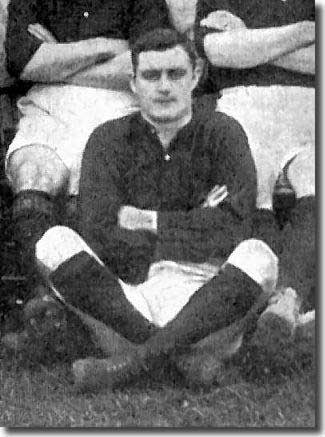 than
at inside-right.' The two main strikers both wanted to lead the attack
and their styles did not seem to be compatible.
than
at inside-right.' The two main strikers both wanted to lead the attack
and their styles did not seem to be compatible.
When the trip the following weekend to Burnley brought a 4-1 reverse,
there was a fear that the improvement over the previous month had been
a false dawn, but matters improved when City entertained Gainsborough
Trinity on 12 November.
Sportsman: 'Not since they defeated Lincoln City on the opening day of
last season have Leeds City prevailed by such a substantial margin as
on Saturday, when they routed Gainsborough Trinity by the decisive score
of four goals to none.
'When all due allowance has been made for the shortcomings of Gainsborough,
it must be admitted that Leeds City succeeded by really good football,
the forwards, who combined most effectively, giving an excellent display.
The Gainsborough halves simply could not hold them, and consequently their
backs experienced a most unenviable afternoon, spent for the most part
in a vain endeavour to check an elusive front rank, who played with a
method and judgement which might easily have penetrated a more skilful
defence.
'City's first goal was obtained by Enright, who beat Webster and scored
with a slanting shot which struck the far post and glanced inwards, whilst
Gillespie registered the second with a long drive. Resuming with an advantage
of two goals, Leeds City for a considerable period altogether outclassed
their opponents, and hardly had McLeod put on the third point from a centre
by Roberts, ere Gillespie, rushing in, netted the final goal following
a free kick just outside the penalty area awarded for a foul on the right
winger.
'Bromage experienced a comparatively easy afternoon. Affleck and Creighton,
though seldom severely tested, were a reliable pair. The halves were satisfactory,
though … they were rather inclined at times to hang back and devote their
energies to defensive work when they might reasonably have adopted a forward
policy. The bright particular star in the forward line was McLeod, who
gave a fine exhibition and well deserved the applause which greeted his
efforts at the close.'
The victory saw City move off the foot of the table, albeit only on goal
average. They were back at the bottom again after a 3-0 defeat at Bolton,
but returned to form with a heartwarming 4-0 victory at Stockport County.
The game brought the first change in the line up in seven matches with
Harry Bridgett replacing Croot to make only his second appearance since
moving from Stoke in May 1909. He scored one of the goals, with Gillespie
(2) and McLeod supplying the others, though he pulled up no trees. The
win was based on a sound defensive display, with Joe Enright supplementing
the half-back line for most of the game.
Another win came on 3 December when City entertained Derby County, succeeding
by the odd goal in five, with Roberts scoring twice. Sportsman: 'The City
fully maintained their improved form on Saturday … to the obvious delight
of the majority of the ten or twelve thousand spectators present. And
let it be recorded that they thoroughly deserved their success, which
was a just reward for the determination and persistence they displayed
in the face of events which pointed to their failure.
'Viewed from a purely scientific standpoint the game never rose to great
heights, but it was hard, fast and interesting football that we saw, and
the excitement was maintained almost throughout. Leeds City's success
was attained rather by the whole hearted efforts of the team than by the
individual brilliance of any of its members, and if Roberts, Enright,
Cubberley and Creighton were somewhat more prominent than their fellows,
they were given satisfactory assistance. True there were defects. One
or two lapses cost them dearly. But such perseverance and determination
more than compensated for any deficiencies, and few, indeed, must be those
who would withhold from them that credit to which they are entitled.'
Three wins in four games had seen City ease their way up the Second Division
rankings and they were now fourteenth.
Unfortunately, the team's form was fluctuating wildly, veering haphazardly
from the sublime to the ridiculous: on 10 December they faced Barnsley
at their Oakwell ground with the South Yorkshire side three places below
them. In wretched conditions and gathering gloom, City were routed 4-0,
with only Tom Morris standing between them and utter humiliation, as observed
by Oakwell in the Mercury: 'Morris, the City's veteran centre-half,
(rose) to such a height that, despite his side's heavy reverse, he may
with justice be described as the best man on the field. At least he was
the most prominent.
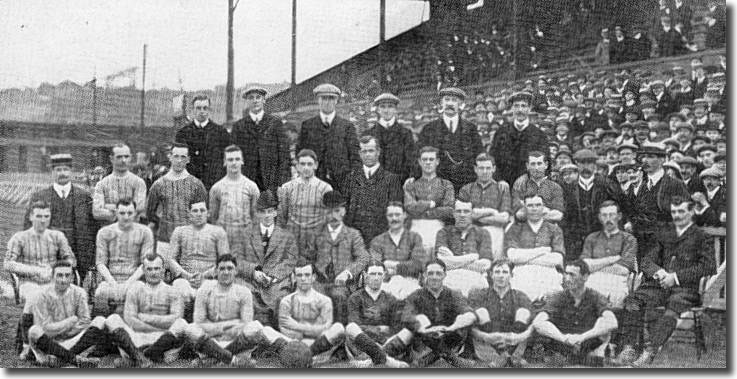 'From
the first he took the measure of Barnsley's attack, and playing as though
by instinct he single handed repelled rush after rush, using both head
and feet in a manner which often suggested that he was carrying the Leeds
team on his back. During the first half Morris played a brilliant game.
He broke up every short passing movement that was initiated by the home
forwards, and it was only a stroke of ill luck which turned a fine header
from him over instead of under the Barnsley crossbar.
'From
the first he took the measure of Barnsley's attack, and playing as though
by instinct he single handed repelled rush after rush, using both head
and feet in a manner which often suggested that he was carrying the Leeds
team on his back. During the first half Morris played a brilliant game.
He broke up every short passing movement that was initiated by the home
forwards, and it was only a stroke of ill luck which turned a fine header
from him over instead of under the Barnsley crossbar.
back to top
'Towards the end of the game Morris tired. It was impossible for him
to do three men's work without feeling the strain, and it was when this
point of the game arrived that Barnsley went straight ahead. But if the
other men on the Leeds side had done half so well as Morris did, Leeds
would not have been beaten by four clear goals.'
When City recovered from 2-0 down at home to Leicester Fosse a week later
to draw level through goals from Morris and Enright, it seemed they might
secure an unlikely draw, but a late misunderstanding undid a sterling
fightback. Sportsman: 'In the last minute of the game came the disheartening
climax which completely extinguished the enthusiasm of the bulk of the
five or six thousand spectators present. Leicester worked their way down
the field, and Owen crossed the ball from the left wing. The ball was
travelling towards the goal, but doubtless Bromage would have had little
difficulty in clearing had not Creighton intervened. The Leeds left-back
attempted to kick away, but the greasy ball turned in an opposite direction
to which he intended and entered the net, Bromage, who had a melancholy
task to perform, being obviously quite deceived by the turn of events.
There was just time to resume the game ere Mr J T Howcroft blew his final
solo, and Leicester had triumphed somewhat luckily, yet deservedly, by
the odd goal in five.'
Tom Mulholland returned for his second appearance of the season in place
of the injured McLeod when City faced promotion chasing Wolves at Molineux
on Christmas Eve; the Peacocks fought hard and gave the Wanderers a hard
game before losing 3-1.
Boxing Day saw McLeod and Fred Croot back in the side for a home game
against Chelsea, also in the running for the title. The Londoners had
much the better of the contest, according to Sportsman in the Mercury,
'proving themselves the cleverer exponents of the finer art of football.'
George 'Gatling Gun' Hilsdon, the first Chelsea player to score 100 goals
for the club and also their first England international, notched a hat
trick, but on each occasion City managed to equalise, Roberts, Croot and
McLeod getting the goals.
The draw owed more to Chelsea complacency than City tenacity, but nevertheless
the Leeds men had shown up well in games against top class opposition
and the mood was much more optimistic as the year drew to a close.
A first half injury to Clapton Orient custodian Bower the next day meant
that the Londoners were always struggling after Mulholland gave City the
lead and Leeds ran out more comfortable winners than the 1-0 score suggested.
A 2-1 victory at Blackpool on New Year's Eve was rather more impressive.
The Seasiders were another side in the top six and were previously 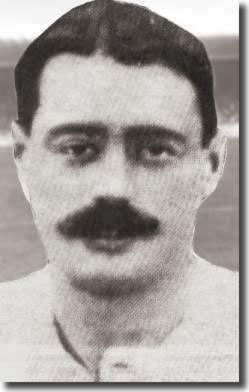 undefeated
at home. The City selection was disrupted by injury, with Enright, Gillespie
and Croot all absent. Bridgett covered for Croot and Stan Cubberley was
forced to play out of position up front. According to the Yorkshire
Post, 'Cubberley was hopelessly out of place, and occasionally went
back to his proper position in the half-back line, but the appearance
of McLeod at centre was a very important factor in the City's success.'
undefeated
at home. The City selection was disrupted by injury, with Enright, Gillespie
and Croot all absent. Bridgett covered for Croot and Stan Cubberley was
forced to play out of position up front. According to the Yorkshire
Post, 'Cubberley was hopelessly out of place, and occasionally went
back to his proper position in the half-back line, but the appearance
of McLeod at centre was a very important factor in the City's success.'
Leeds went ahead in the third minute when McLeod scored from a Bridgett
cross. The forward had a second effort disallowed, seemingly for handball.
Bridgett made it 2-0 before half-time, firing a Roberts cross in off the
post. Wolves pulled one back before the break, but the second half was
goalless and City thus avenged their opening day defeat by securing a
second victory on the bounce.
The win was the consequence of another sound defensive display by Morris,
Creighton and Bromage, with City making better use of their attacking
moments.
14th place in the table was not what City had hoped for at the start
of the season, and they were too many points removed from the upper reaches
of the division to harbour realistic hopes of a late promotion chase.
However, after their inauspicious opening run of four straight defeats
they had at least achieved a measure of respectability.
Part 2 - Results
and table
Other Football Highlights from 1910/11
- A new trophy was needed for the FA Cup competition when the FA presented
the trophy to Lord Kinnaird to mark his 21st year as president. A redesigned
Cup was made in Bradford, and after the replayed Cup final at Old Trafford
it stayed there, Bradford City beating Newcastle 1-0 to win their first
major honour. The winner was scored by Jimmy Speirs, soon to move to
Leeds City. This was Newcastle's fourth defeat in five finals in seven
years
- Three days after Bradford City won the Cup at Manchester United's
new home, Old Trafford, the ground was the scene of a great United victory,
5-1 over Sunderland, which gave them their second League title in four
years. Again they won with 52 points, and again it was Aston Villa who
were runners up, but this time by only one point instead of nine
- England won the Home International Championship with 5 points, their
tenth win in 14 years
back to top












 sale of Jimmy Gemmell (Sunderland), Tom Naisby (Luton) and Jock Watson
(Clyde). In October 1910, Jack White was also on his way, to Merthyr Tydfil.
Scott-Walford badly needed to rebuild his playing strength if City were
to compete effectively. The previous season had made that much clear.
sale of Jimmy Gemmell (Sunderland), Tom Naisby (Luton) and Jock Watson
(Clyde). In October 1910, Jack White was also on his way, to Merthyr Tydfil.
Scott-Walford badly needed to rebuild his playing strength if City were
to compete effectively. The previous season had made that much clear. Dublin
Shelbourne, Belfast Distillery and Cliftonville clubs, and to the public,
who were present in very encouraging numbers indeed, and who tried their
utmost, by means of the new battle cry, 'Play up Ireland!' to stimulate
the young men on whom so much depends into putting forth their greatest
efforts.'
Dublin
Shelbourne, Belfast Distillery and Cliftonville clubs, and to the public,
who were present in very encouraging numbers indeed, and who tried their
utmost, by means of the new battle cry, 'Play up Ireland!' to stimulate
the young men on whom so much depends into putting forth their greatest
efforts.' Leeds
Mercury: 'Leeds City … displayed better football than they had previously
done on their own ground this season, and well deserved their victory
by the only goal the game produced. True, 'one swallow does not make a
summer,' but, if only for a brief space, the darkness has been pierced,
and the club's supporters are thankful in that a little light has burst
through the surrounding gloom.
Leeds
Mercury: 'Leeds City … displayed better football than they had previously
done on their own ground this season, and well deserved their victory
by the only goal the game produced. True, 'one swallow does not make a
summer,' but, if only for a brief space, the darkness has been pierced,
and the club's supporters are thankful in that a little light has burst
through the surrounding gloom. than
at inside-right.' The two main strikers both wanted to lead the attack
and their styles did not seem to be compatible.
than
at inside-right.' The two main strikers both wanted to lead the attack
and their styles did not seem to be compatible.  'From
the first he took the measure of Barnsley's attack, and playing as though
by instinct he single handed repelled rush after rush, using both head
and feet in a manner which often suggested that he was carrying the Leeds
team on his back. During the first half Morris played a brilliant game.
He broke up every short passing movement that was initiated by the home
forwards, and it was only a stroke of ill luck which turned a fine header
from him over instead of under the Barnsley crossbar.
'From
the first he took the measure of Barnsley's attack, and playing as though
by instinct he single handed repelled rush after rush, using both head
and feet in a manner which often suggested that he was carrying the Leeds
team on his back. During the first half Morris played a brilliant game.
He broke up every short passing movement that was initiated by the home
forwards, and it was only a stroke of ill luck which turned a fine header
from him over instead of under the Barnsley crossbar. undefeated
at home. The City selection was disrupted by injury, with Enright, Gillespie
and Croot all absent. Bridgett covered for Croot and Stan Cubberley was
forced to play out of position up front. According to the Yorkshire
Post, 'Cubberley was hopelessly out of place, and occasionally went
back to his proper position in the half-back line, but the appearance
of McLeod at centre was a very important factor in the City's success.'
undefeated
at home. The City selection was disrupted by injury, with Enright, Gillespie
and Croot all absent. Bridgett covered for Croot and Stan Cubberley was
forced to play out of position up front. According to the Yorkshire
Post, 'Cubberley was hopelessly out of place, and occasionally went
back to his proper position in the half-back line, but the appearance
of McLeod at centre was a very important factor in the City's success.'